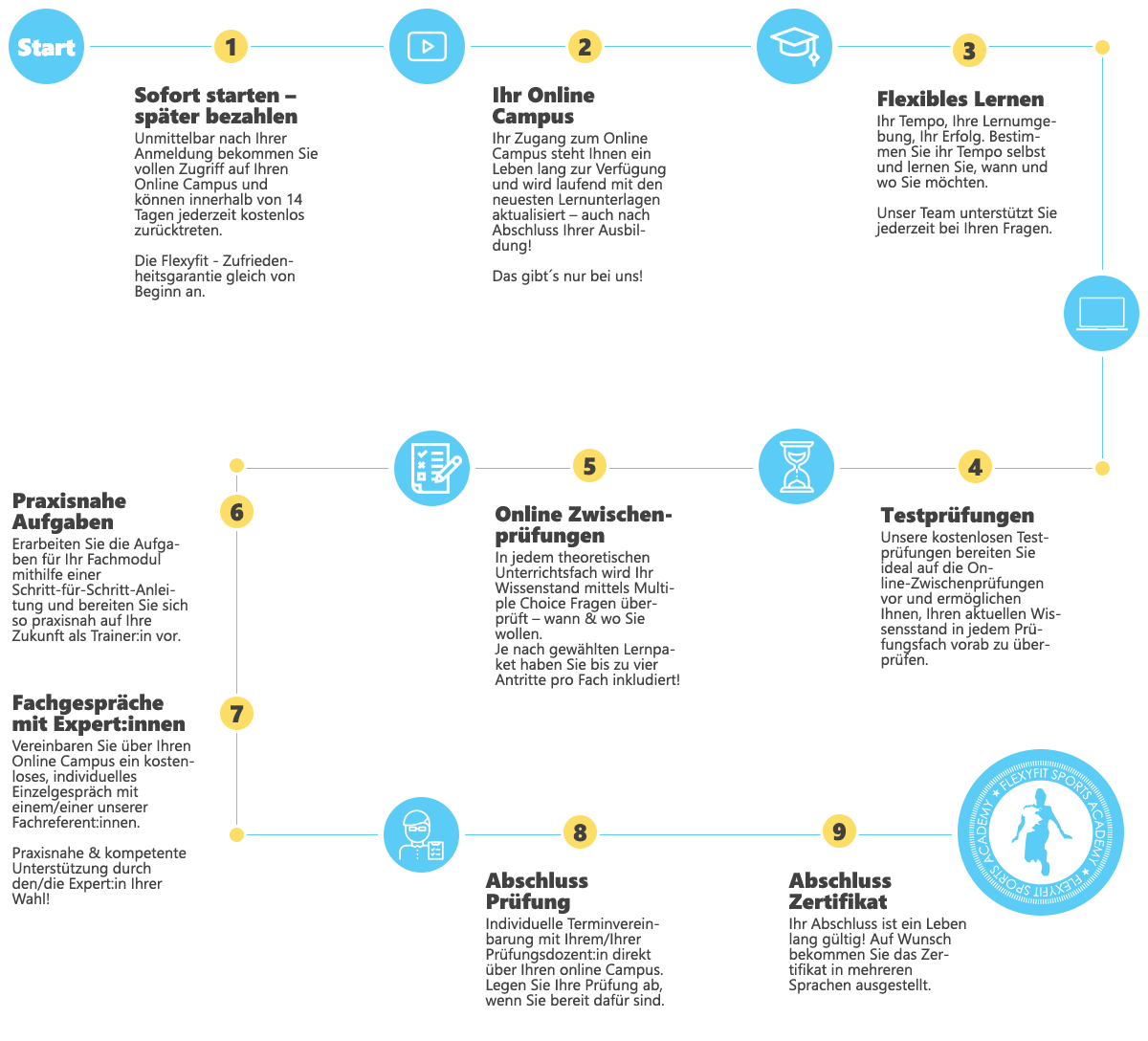Top ratings
Get free trial access now Try first, then study!
4.92/5.0 (from 386 Trusted Shops Reviews )
4.9/5.0
- Google reviews

















starting at €798,- | Online Course
» Our Course Packages
Flexible learning - our possible learning options for the course:
Important informations
Recognized & Certified
Our graduates, partners & friends say
Our team will be happy to advise you at any time by phone, chat or in person
Extent of learning
475 E
EQF level
The training is based on EQF level 3 »
Course start
Possible immediately
Learning variant
Online Courses
Available
Languages

Diseases resulting from poor eating habits are still on the rise. Crash diets and one-sided diets only provide short-term relief. In the training to become a nutrition trainer B license, it is therefore our primary goal to impart nutrition-specific basic knowledge and to critically question various nutrition trends.
We want to bring you up to date in terms of healthy nutrition and provide you with skills that will enable you to optimally care for your customers.
Within the framework of the basic module, anatomical and nutritional-physiological content is first taught. Based on this, the fundamentals of nutrition and how to teach them in practice are dealt with more specifically. In addition, the focus is on various forms of nutrition, diets, and special sports nutrition.
Whether you want to use the online course nutrition trainer B license to improve your own lifestyle and nutrition, or whether you want to use the online trainer license as the basis for the next step, the diploma nutrition trainer we are the right place for you.
Our certificates are valid worldwide and are issued in different variants. Upon request, you will receive our certificate in several languages (DE, EN, ES), with country-specific information as well as with and without printed grades.
All these variants are available for free download on your online campus for a lifetime. In addition, depending on the learning package you purchase, you will receive a certificate of your choice, issued on special high-quality paper with embossed printing.
The following certificate (in several languages DE, EN, ES) will be awarded:
We are happy to help you by contact by phone, via e-mail or chat. However, you may find the answer to your question in our general FAQ or fitness trainer FAQ.
You start your training with the basic module Sports Competence. In this module, you will be taught theoretical knowledge in eight different subjects through videos and scripts. At the end of each subject you will take a short multiple choice online exam to test your understanding.
Completion of the basic module Sports Competence is followed by the B module... your professional specialization, where you study your chosen subject.
Since our training courses are very flexible, the duration depends a lot on your own learning initiative, the amount of time you spend each week, and your prior knowledge.
You learn at your own pace and when or where you want. Your Academy account accompanies you on your computer, tablet or smartphone and includes everything you need to complete the training.
You have access to over 600 Full HD learning videos in which our first-class instructors teach you the training content. In addition, you can also read the same content in our scripts and presentations.
You work on your grade with practical sessions and voluntary additional tasks that are available to you. These include training logs, written essays, and filming of exercises.
As part of your training, you take multiple-choice online exams as well as an online final exam.

Extent of learning
200
Sports expertise
233
eLearning | Presence
6
Literature research
30
Practical realization
6
Additional tasks & examinations
This course is ideal for educational leave. Individual assessment and approval is carried out by the respective funding body. We will be happy to provide you with detailed information on the duration and procedure of educational leave. Contact us to arrange a consultation!
Participation in the face-to-face webinars is mandatory for educational leave and must be proven to the AMS. The participant is responsible for requesting confirmation of attendance. Confirmation of attendance of the face-to-face webinar will only be issued during each webinar if requested by the participant.
Show all chapters of the subjects

We educate the best trainers in the fitness branch. From start to finish of the education - and beyond!- we support and guide our students.
Functional anatomy is a foundation necessary for all trainers in exercise, fitness and sports. This subject provides a comprehensive introduction to the anatomy of the human body and a wellspring of important knowledge.
The course is constructed to present the information in an interesting and comprehensible manner and features different learning approaches appropriate for Fitness and Personal Trainers.
The goal is, to understand the relationship between movement patterns, the human body and relevant anatomical terminology.
Show chapter

Show chapter

Show chapter

More and more companies are integrating Corporate Wellness and similar health initiatives into their employee benefits packages. By doing so they promote the health and well-being of their employees, reducing the incidence of sick-leave and building healthier, stronger team dynamics.
Exactly why such initiatives are important is discussed in this introduction to the concept, as well as challenges that such initiatives face including organisational dysfunction.
Participants also learn about the advantages of corporate wellness and some trusted approaches and tools for finding and working with a company.
We offer suggestions on how to approach companies about Corporate Wellness, how to develop a corporate wellness concept and important organisational points to consider.
Participants will be exposed to some practical examples and will have the possiblity to perform group work on the topic.
Show chapter

The unit on Marketing and Customer Interaction gives participants some insight into identifying, working with and marketing to their ideal customer. This is one of the most useful units for the aspiring trainer, as it helps them identify their place in the market, which makes for a more successful career start.
We begin by taking a look at Marketing itself to understand exactly what it is and of what relevance it has for personal trainers.
Important basic concepts such as USP, positioning, target market, etc. are introduced and different models from marketing such as the SMART Formula, marketing mix (7Ps) and more are explained.
The communication between trainer and client is also addressed in this unit. Various aspects of communication theory and some guidelines for successful communication are covered.
Upon completion of this subject, participants are able to develop marketing strategies for their product and/or services, ready to position themselves in a market rich in variety and full of possibility!
Show chapter

A working understanding of human physiology and therefore the relationships between the various functions of the human body is crucial for anyone working in the exercise and fitness field. It is a requisite knowledge for the sufficient practice of their profession.
This course makes the relationships within the human organism graspable for everyone. Take a deep-dive into the human body and learn the functions of our organism for your new profession in fitness.
In this subject you will get a close look at energy metabolism needed for muscle activation, the circulatory system and the pulmonary system.
Any high quality education in fitness and exercise begins with the foundations of anatomy and physiology.
Show chapter

In this unit participants are prepared for successful communication with their clients on every level. In addition, we take a look at how the trainer or coach can go about dealing with their own goals and motives, which will in turn help them better understand their clients.
The right goal-setting and the proper approach to feedback are an important parts of this unit.
The way we manage stress as trainers and with our clients and a variety of learning strategies are explored so these skills can be integrated into your professional approach.
Show chapter

In this introduction to training theory we look at the foundations of training plan creation and management, including the principles of training, training methodology and factors that influence sports performance.
Because performance capacity, performance diagnostics, training and competition are so interrelated, they are covered together in this unit.
The second half of this unit Im zweiten Teil der Trainingslehre wird das Training als komplexer Handlungsprozess und im Zusammenhang mit Planung, Ausführung und Evaluation definiert und bewertet.
Ein wichtiger Teil der Trainingslehre ist nach wie vor die Trainingsplangestaltung, die mit Beispielen über die Möglichkeiten einer Trainingsplangestaltung praktisch vermittelt werden.
Um das Thema der Trainingswissenschaft zu vertiefen, laden wir regelmäßig internationale Top-Dozenten wie Univ. Prof. Dr. Paul Haber und Prof.em. Dr.phil. Dr.med. Dr. hc Jürgen Weineck zu uns in die Academy ein.
Unter anderem sind sie für die Bücher "Optimales Training" (Jürgen Weineck) und "Leistungsphysiologie" (Paul Haber) in der Trainingswissenschaft bekannt.
Show chapter
Show all chapters of the subjects

Show chapter

Show chapter

Show chapter

Show chapter
Our Nutrition Trainer B-Licence course is certified by the ZFU (Zul.-No.: 7343919) and includes the basic module Sports Competence (Zul.-No.: 7324018c)
As a recognized institution in adult education, our curricula are regularly evaluated and approved by governmental authorities and funding organizations. We are constantly striving to exceed the current quality standards to guarantee you the best possible education. See for yourself the certifications we have earned.
At Flexyfit Sports Academy you have various opportunities to support your education. There are different scholarship programs at the state and EU levels, as well as tax incentives that serve as a basis.
Please note, however, that the decision on the assignment and extent of the scholarship is the absolute responsibility of the respective funding agency.
We are happy to help you finding a suitable finacial support and provide you with all the course information you need for a scholarship application. You must submit the application itself to the relevant funding agencies.
Yes, the majority of our courses are suitable for educational leave
If you wish to study without quitting your job, you can arrange an educational leave with your employer. In this case you will be released from work for the duration of the course.
Plan your educational leave with us now! We are happy to help you determine your individual training needs in a personal, non-binding consultation .
Please note that this is a general summary and it is advised that further details and conditions be obtained from the appropriate agencies or authorities.
For an educational leave, the approval of your employer is required. You must submit the educational plans issued by us, which include a volume of 20 hours per week for a full-time educational leave or at least 10 hours per week for a part-time educational leave.
In addition, it is necessary to provide regular evidence of the progress of your training, for example through examinations or attendance certificates issued by us.
Writing nutrition plans for nutrition trainers is also not allowed in the context of self-employment. Knowledge transfer in the form of teaching activities (e.g.: in the context of lectures, workshops, seminars, etc.) is as such excluded from the scope of application of the Trade Regulation Act according to § 2 GewO, i.e. no trade license is required for this. Nutritional training is permitted if it does not encroach upon the area of nutritional counseling (§ 119 Abs.1 GewO).
In Germany, the terms nutrition trainer and nutritionist are the same, but here a distinction is made between them and the medical profession of dietician. With the nutrition trainer training in Germany, one may supervise healthy people in a change of diet, or also advise people who want to fundamentally improve their diet.
As a nutrition trainer, you can become self-employed and either impart your knowledge on the subject of nutrition directly to customers or work with groups in lectures, workshops and seminars.
In a permanent position, you work, for example, in fitness and wellness hotels as a contact person for all questions regarding healthy and balanced nutrition.
On our platform Sportkarriere we always list job advertisements of fitness studios. There you can apply directly for jobs as a fitness trainer, branch manager, instructor or studio employee.

Diseases resulting from poor eating habits are still on the rise. Crash diets and one-sided diets only provide short-term relief. In the training to become a nutrition trainer B license, it is therefore our primary goal to impart nutrition-specific basic knowledge and to critically question various nutrition trends.
We want to bring you up to date in terms of healthy nutrition and provide you with skills that will enable you to optimally care for your customers.
Within the framework of the basic module, anatomical and nutritional-physiological content is first taught. Based on this, the fundamentals of nutrition and how to teach them in practice are dealt with more specifically. In addition, the focus is on various forms of nutrition, diets, and special sports nutrition.
Whether you want to use the online course nutrition trainer B license to improve your own lifestyle and nutrition, or whether you want to use the online trainer license as the basis for the next step, the diploma nutrition trainer we are the right place for you.
Our certificates are valid worldwide and are issued in different variants. Upon request, you will receive our certificate in several languages (DE, EN, ES), with country-specific information as well as with and without printed grades.
All these variants are available for free download on your online campus for a lifetime. In addition, depending on the learning package you purchase, you will receive a certificate of your choice, issued on special high-quality paper with embossed printing.
The following certificate (in several languages DE, EN, ES) will be awarded:
We are happy to help you by contact by phone, via e-mail or chat. However, you may find the answer to your question in our general FAQ or fitness trainer FAQ.
You start your training with the basic module Sports Competence. In this module, you will be taught theoretical knowledge in eight different subjects through videos and scripts. At the end of each subject you will take a short multiple choice online exam to test your understanding.
Completion of the basic module Sports Competence is followed by the B module... your professional specialization, where you study your chosen subject.
Since our training courses are very flexible, the duration depends a lot on your own learning initiative, the amount of time you spend each week, and your prior knowledge.
You learn at your own pace and when or where you want. Your Academy account accompanies you on your computer, tablet or smartphone and includes everything you need to complete the training.
You have access to over 600 Full HD learning videos in which our first-class instructors teach you the training content. In addition, you can also read the same content in our scripts and presentations.
You work on your grade with practical sessions and voluntary additional tasks that are available to you. These include training logs, written essays, and filming of exercises.
As part of your training, you take multiple-choice online exams as well as an online final exam.

Extent of learning
200
Sports expertise
233
eLearning | Presence
6
Literature research
30
Practical realization
6
Additional tasks & examinations
This course is ideal for educational leave. Individual assessment and approval is carried out by the respective funding body. We will be happy to provide you with detailed information on the duration and procedure of educational leave. Contact us to arrange a consultation!
Participation in the face-to-face webinars is mandatory for educational leave and must be proven to the AMS. The participant is responsible for requesting confirmation of attendance. Confirmation of attendance of the face-to-face webinar will only be issued during each webinar if requested by the participant.
Show all chapters of the subjects

We educate the best trainers in the fitness branch. From start to finish of the education - and beyond!- we support and guide our students.
Functional anatomy is a foundation necessary for all trainers in exercise, fitness and sports. This subject provides a comprehensive introduction to the anatomy of the human body and a wellspring of important knowledge.
The course is constructed to present the information in an interesting and comprehensible manner and features different learning approaches appropriate for Fitness and Personal Trainers.
The goal is, to understand the relationship between movement patterns, the human body and relevant anatomical terminology.
Show chapter

Show chapter

Show chapter

More and more companies are integrating Corporate Wellness and similar health initiatives into their employee benefits packages. By doing so they promote the health and well-being of their employees, reducing the incidence of sick-leave and building healthier, stronger team dynamics.
Exactly why such initiatives are important is discussed in this introduction to the concept, as well as challenges that such initiatives face including organisational dysfunction.
Participants also learn about the advantages of corporate wellness and some trusted approaches and tools for finding and working with a company.
We offer suggestions on how to approach companies about Corporate Wellness, how to develop a corporate wellness concept and important organisational points to consider.
Participants will be exposed to some practical examples and will have the possiblity to perform group work on the topic.
Show chapter

The unit on Marketing and Customer Interaction gives participants some insight into identifying, working with and marketing to their ideal customer. This is one of the most useful units for the aspiring trainer, as it helps them identify their place in the market, which makes for a more successful career start.
We begin by taking a look at Marketing itself to understand exactly what it is and of what relevance it has for personal trainers.
Important basic concepts such as USP, positioning, target market, etc. are introduced and different models from marketing such as the SMART Formula, marketing mix (7Ps) and more are explained.
The communication between trainer and client is also addressed in this unit. Various aspects of communication theory and some guidelines for successful communication are covered.
Upon completion of this subject, participants are able to develop marketing strategies for their product and/or services, ready to position themselves in a market rich in variety and full of possibility!
Show chapter

A working understanding of human physiology and therefore the relationships between the various functions of the human body is crucial for anyone working in the exercise and fitness field. It is a requisite knowledge for the sufficient practice of their profession.
This course makes the relationships within the human organism graspable for everyone. Take a deep-dive into the human body and learn the functions of our organism for your new profession in fitness.
In this subject you will get a close look at energy metabolism needed for muscle activation, the circulatory system and the pulmonary system.
Any high quality education in fitness and exercise begins with the foundations of anatomy and physiology.
Show chapter

In this unit participants are prepared for successful communication with their clients on every level. In addition, we take a look at how the trainer or coach can go about dealing with their own goals and motives, which will in turn help them better understand their clients.
The right goal-setting and the proper approach to feedback are an important parts of this unit.
The way we manage stress as trainers and with our clients and a variety of learning strategies are explored so these skills can be integrated into your professional approach.
Show chapter

In this introduction to training theory we look at the foundations of training plan creation and management, including the principles of training, training methodology and factors that influence sports performance.
Because performance capacity, performance diagnostics, training and competition are so interrelated, they are covered together in this unit.
The second half of this unit Im zweiten Teil der Trainingslehre wird das Training als komplexer Handlungsprozess und im Zusammenhang mit Planung, Ausführung und Evaluation definiert und bewertet.
Ein wichtiger Teil der Trainingslehre ist nach wie vor die Trainingsplangestaltung, die mit Beispielen über die Möglichkeiten einer Trainingsplangestaltung praktisch vermittelt werden.
Um das Thema der Trainingswissenschaft zu vertiefen, laden wir regelmäßig internationale Top-Dozenten wie Univ. Prof. Dr. Paul Haber und Prof.em. Dr.phil. Dr.med. Dr. hc Jürgen Weineck zu uns in die Academy ein.
Unter anderem sind sie für die Bücher "Optimales Training" (Jürgen Weineck) und "Leistungsphysiologie" (Paul Haber) in der Trainingswissenschaft bekannt.
Show chapter
Show all chapters of the subjects

Show chapter

Show chapter

Show chapter

Show chapter
Our Nutrition Trainer B-Licence course is certified by the ZFU (Zul.-No.: 7343919) and includes the basic module Sports Competence (Zul.-No.: 7324018c)
As a recognized institution in adult education, our curricula are regularly evaluated and approved by governmental authorities and funding organizations. We are constantly striving to exceed the current quality standards to guarantee you the best possible education. See for yourself the certifications we have earned.
At Flexyfit Sports Academy you have various opportunities to support your education. There are different scholarship programs at the state and EU levels, as well as tax incentives that serve as a basis.
Please note, however, that the decision on the assignment and extent of the scholarship is the absolute responsibility of the respective funding agency.
We are happy to help you finding a suitable finacial support and provide you with all the course information you need for a scholarship application. You must submit the application itself to the relevant funding agencies.
Yes, the majority of our courses are suitable for educational leave
If you wish to study without quitting your job, you can arrange an educational leave with your employer. In this case you will be released from work for the duration of the course.
Plan your educational leave with us now! We are happy to help you determine your individual training needs in a personal, non-binding consultation .
Please note that this is a general summary and it is advised that further details and conditions be obtained from the appropriate agencies or authorities.
For an educational leave, the approval of your employer is required. You must submit the educational plans issued by us, which include a volume of 20 hours per week for a full-time educational leave or at least 10 hours per week for a part-time educational leave.
In addition, it is necessary to provide regular evidence of the progress of your training, for example through examinations or attendance certificates issued by us.
Writing nutrition plans for nutrition trainers is also not allowed in the context of self-employment. Knowledge transfer in the form of teaching activities (e.g.: in the context of lectures, workshops, seminars, etc.) is as such excluded from the scope of application of the Trade Regulation Act according to § 2 GewO, i.e. no trade license is required for this. Nutritional training is permitted if it does not encroach upon the area of nutritional counseling (§ 119 Abs.1 GewO).
In Germany, the terms nutrition trainer and nutritionist are the same, but here a distinction is made between them and the medical profession of dietician. With the nutrition trainer training in Germany, one may supervise healthy people in a change of diet, or also advise people who want to fundamentally improve their diet.
As a nutrition trainer, you can become self-employed and either impart your knowledge on the subject of nutrition directly to customers or work with groups in lectures, workshops and seminars.
In a permanent position, you work, for example, in fitness and wellness hotels as a contact person for all questions regarding healthy and balanced nutrition.
On our platform Sportkarriere we always list job advertisements of fitness studios. There you can apply directly for jobs as a fitness trainer, branch manager, instructor or studio employee.

4.92/5.0 (from 386 Trusted Shops Reviews )

Available course variations
Language of Instruction
Course Module
Fitness Fundamentals
Fitness basics (presence)
Fitness Fundamentals Full HD Video Lessons
Full HD LearningVideos Nutrition Trainer B
Included Course of Study
Course Modality
Study Method
Auditory & Visual Learning Style
Communicative & Kinesthetic Learning Style
Study Timeframe
Text & Presentation PDFs
Lectures Bookable as Classroom Units
Support via Online Campus, E-mail, Chat, Tel.
WhatsApp & On-site Support
Test/Dummy Exam
NADA Austria
Altitude Training - Prof. Dr. Weineck
Fitness Fundamentals Theory Exams Online
Final Exam
Certificate in DE, EN or ES
Certificate accepted worldwide & never expires
Lifetime Access to Online Campus
Free Demo Account / Trial Package
Certificate Copy as Downloadable PDF
Certificate with Verification via QR-Code
Financial Aid/Grant Opportunities
Paid Educational Leave (AT)
Grants for Businesses
Grants for Self-Employed Persons
Course Advising
Cost Estimate for Financial Aid Provider
Job Openings Mailing List
Comprehensive Training Opportunities
Absolute Best Price & Service Offer
DE, EN
Online + technical discussion
Optionally bookable
314
121
B-License
online
visual
recommended
suitable
Flexible
postable
Flexible date
up to 100%
non-binding
2 weeks ago
Very well organized team, uncomplicated operation of online lessons, versatile informative script :) All in all top!
posted on
2 weeks ago
I am very impressed with Flexyfit, always nice and helpful people. Very sympathetic. Thank you very much for your great support.
posted on
3 weeks ago
Great training and super nice people. You can tell how much emphasis is placed on conveying the necessary knowledge to the course participants in an understandable way. I was even kindly allowed to take a course completely free of charge after there were somewhat problematic and disruptive participants in my group. I will 100% take more courses with you in the future because learning is extremely fun, especially thanks to the friendly staff!
posted on
3 weeks ago
The entire flexyfit team is extremely friendly, prompt and helpful. The lecturers are competent and respond to the course participants. All learning materials were provided clearly and in sufficient detail. The additional videos mean there is something for every type of learner. All in all, the training and exam went well. I can definitely recommend flexyfit and will be happy to book and recommend further training courses with you again!
posted on
a months ago
A great team - competent, friendly, always helpful and supportive - provided excellent support for the practical training. We recommend! :)
posted on
a months ago
Great support and extensive course content. We recommend!
posted on
a months ago
I really enjoyed training to become a B-license fitness trainer there. The teaching materials provided are great and flawless. I learned a lot of new things there and always enjoyed what I was doing. The team is great and is always there for you if you have any questions!
posted on
a month ago
The best thing that could have happened to me is this academy. Access to participants is excellent. All employees are very competent, very professional and very friendly. A person can learn so much that it is indescribably good. I would recommend it to everyone. When I arrived in Austria I was looking for something like this and luckily I found this academy and signed up for the course without hesitation. Everything we get in return is worth 100 times more than what we pay. Indescribable experience, indescribable people, once again and 1000 times I say: Thank you for everything, thank you for this indescribable experience. THANK YOU, THANK YOU, THANK YOU
posted on
a months ago
I was able to learn a lot of new things as part of my training at the Flexyfit Academy and was able to take on a new, demanding challenge with my chosen course. The structure of the training courses is very understandable and clear, so that you can master the distance learning course on your own without any problems. If there were any questions, ambiguities or isolated problems, the Academy team was always quick to help and we could always find a common solution. Here and there I would have liked a little more practical relevance. Nevertheless, I always felt very comfortable, had great speakers and with my degree as a qualified medical sports coach, many new doors are now open to me :)
posted on
2 months ago
I was able to complete my chosen course very well and quickly. The team is very quick and courteous and you are always offered a good solution if there are any uncertainties. I will book again when I get the chance and can recommend the academy!
posted on
Select your preferred course modality and find the fitness education that suits your interests

Please select a learning variant or enter a search text!

38.945 satisfied customers - from Sweden and 13 other countries.